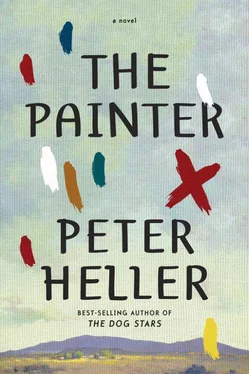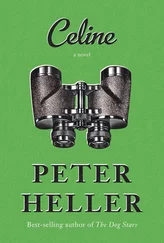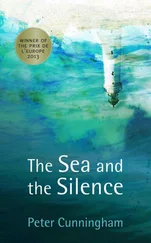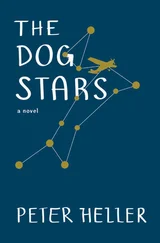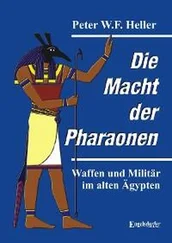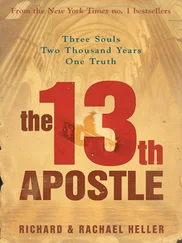They were drunk and half dressed—she in a robe, he in boxers and a t-shirt—when I came through the door. They were sitting on the couch in the trailer watching the cooking channel. The cooking channel. Instead of being abashed, Mom went after me, yelling at me for surprising her. I thought you were surfing , she yelled. I stammered that there was no swell, I was stunned, more than hurt by the whole scene. Gus watched me. I remember him blurry drunk, but there was something in his look that seemed sympathetic, like I have a clue what you’re going through and I’m sorry . I didn’t want his fucking sympathy, and I didn’t want my mother to be a slut and I didn’t want my father dead. Okay okay, I kept repeating and disappeared into my room, and filled a rucksack and said on the way out the door, I’m spending the night with Eddy. She came after me as I hit the outside steps, grabbed my arm, spun me. She was a strong woman, physically strong.
She said, “Jimmy, you—I—”
Her eyes were red rimmed and afraid. I remember thinking for the first time that she might get old one day. That scared me as much as the scene inside, and also how much I loved her. Way too much. I couldn’t stand any of it. I couldn’t take it all in and I tore myself from her grip and fled.
I didn’t spend the night with Eddy. I stuck my thumb out on Route 1 and I ran away. Is that what it is when you’re sixteen? I guess. Not really. I went to my sister Caila’s in Santa Rosa and when I told her the story she let me stay with her for the rest of the school year. Mom visited twice, she had cooled down, and she did not contest this strange custody. I wanted to tell her how much I loved her and didn’t know how. Truly, I was not myself that whole spring. I know what it means when they say beside yourself with grief. That’s what it felt like. Like I was standing always a few feet away from my body as I went through the motions. Remote. From my feelings, from a clear view of anything. All I cared about was reading and surfing and drawing. I turned seventeen and bought a motorcycle. I could carry my shortboard on it. Caila lived on the west side of town and it took about twenty-five minutes to get to a break, and I finished the year and dropped out. I had a clue enough to get my GED before I hit the road and went down to San Francisco. I thought of Mom often, I forgave her, I loved her more than I could bear, and she died in a car wreck on the Arch Rock Cliffs, drunk, before I could tell her any of that. I was shell-shocked. I was living with Caila and Silas and I wandered around like a zombie. I’d go down to the city and just walk and walk and get stoned. Two weeks after the funeral I got into a fight downtown and with my head pounding I wandered into the San Francisco Museum of Modern Art and saw a painting on loan from Boston called The Fog Warning by Winslow Homer. It shocked me. This was a shock of life. The fisherman in his black slicker rowed through a rough gray sea, the stern of his little boat weighted down with a couple of huge fish. The man is in mid-stroke, climbing the back of a wave, and he cranes his head to get a better look at his distant ship and the coming wall of fog bearing down on it out of an ominous evening. He is completely alone and a little alarmed, and capable. If they—the ship, his rowboat—are overcome by fog before he can close the gap he may be lost at sea, forever.
I knew water. From years in the waves surfing I knew how it acted, how it felt. And I felt this windchop. And the groundswell underneath it, and the weight of the stern-heavy boat and how sluggish it would be to row. This sea was alive and the colors, they came through my skin and they were cold. The slates and silvers and grays. And how the man was pinned on the sea between life and death: his catch meant life, for him and his family. But it also weighed him down in a dangerous sea with the fog coming. He had nothing to do but put his back into it and pull another stroke, and another.
How I was feeling, I guess in my own life, why it hit me so hard. The fog meant oblivion, but it also meant respite. I was seventeen and I was already exhausted.
I leaned into the painting and placed a bruised cheek almost to the canvas and eyed along the brushstrokes, trying to fathom how he had done that, made the sea so cold and wet and dangerous with only swipes of pigment. I could feel too the almost metallic scaly cold of the fishes’ flanks. A guard in a blazer told me to step back. I’d had enough anyway. I’d only seen a few rooms and I’d seen enough. I wanted to do that . Make stuff come alive like that. With the wall of fog bearing down on my own life, that one painting gave me a reason to row like a motherfucker. Six weeks later I enrolled at the San Francisco Art Institute. I didn’t graduate, I didn’t even make it halfway through, but I didn’t need to.
I finished gagging, the pages of the transcript on the carpet where I had dropped them. I sat in the wingback chair patterned with lilies that were no doubt supposed to rhyme with the Georgia O’Keeffe flowers, and I shuddered and breathed. Wiped my mouth on the back of my arm. Quivering. I felt empty, empty as a dead shell.
I should eat. No wonder I’d gotten sick, hadn’t eaten anything all day, and I had put my body through a bunch of stresses, including heat, Celia Anson naked, and interrogation. Hot bath, then I’d hunt something up for dinner.
I had a better idea. This was all on Pim wasn’t it? I pushed myself out of the chair, stood unsteadily, went to the phone by the couch. Picked it up, dialed zero. The front desk answered, it was Kimberly the smiling gringa. “Hi, Mr. Stegner!” she sang. “It’s Kim. What can we do for you tonight?”
“Is it night?”
“Nearly. Figure of speech I guess.”
“May I have room service?”
“Certainly. In the future just dial six. Or call me, anytime. I’m here for you.”
“Thanks.”
It occurred to me that one of the problems and the perks of being somewhat famous is that you are connected everywhere, to almost, it seems, everyone. Which is not as sweet as it might seem, when hardly anybody you are connected to really knows you. Seemed that with killing I felt a little more remote from the world. Isn’t that what Fatty said? Wheezy? Secrets make you sick? Well, they were already making me feel lonely.
CHAPTER THREE

Horse and Crow
OIL ON CANVAS
36 X 48 INCHES
I’m sure the designers of the Artist Suite didn’t intend for their patrons to actually paint there. But they must have had enough stained carpet that they wised up and left a circular patch of floor tiled beneath the cove window looking out on Don Gaspar Avenue.
I turned on the TV and watched a cop show, one of those reality deals with videos of car chases that usually end with the suspect crashing his vehicle and fleeing on foot across a median where he is leveled by a German shepherd or three beefy cops with Tasers. In the one I watched it wasn’t a shepherd but a big black Lab that took down our perp while he tried to get through a backyard cluttered with plastic playground equipment. He was a Hispanic kid in a white wife beater and neck chains and he vaulted a little slide set like a pro but the seesaw got him, tripped him headlong and then the Lab was on his back and tearing at his neck. I ate a bowl of tomato bisque and a slice of lasagna off the rolling tray as I watched, and drank a ginger ale on ice and felt a lot better. I didn’t know Labs had it in them.
Then I digested with a segment on the Military Channel where they pit a squad of virtual U.S. Marines, say, against a Roman legion. In this one they had a SEAL sniper team, just two guys, against fifty Comanches on horseback with Henry rifles and bows. The SEALs had to enter the camp and free a white woman captive. I can’t remember why they didn’t get to use their whole SEAL team of five men. They had some good reason. The episode made me sad. Half of the Comanches looked Chinese and none of the horses had the handprints and suns painted on their flanks, what the Comanches were famous for. There was a lot of mayhem in the final assault and the spotter got killed by an arrow as they ran across the shallow river with the girl. I turned off the TV. I set up the easel on the tiles by the bow window and took out another twenty-four thirty-six stretched canvas from the tarp-wrapped bundle, and my paints, and I painted a horse covered in blue and red fish and I put the horse on the edge of a cliff and I put a crow with a blue eye on a rock watching him. The crow’s bill was half open. That’s all. I liked it. The crow was not exactly disinterested, and though a dead horse would mean a big feast, a crow potlatch, the bird I think was telling the horse about choice, that he didn’t have to jump. The horse it was clear was supposed to jump for some reason and had never encountered the concept of choice. Everything in his life had come in a certain order and he had always been told what to do, or knew what to do in his bones, so choice had never come into it.
Читать дальше
